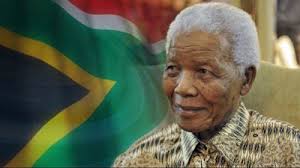Since Nelson Mandela’s death last week, the media has been filled with accounts of his life, his trials, his triumphs, his leadership, and his sacrifice for the causes of freedom, justice, and equality. He was a complex individual, to be sure, but in the end the tributes flow like rivers in praise of the man who delivered South Africa from apartheid, became its first elected black president and used his position of leadership to set an example of forgiveness, inclusivity, and humanity for the world.
So as I’ve read the papers and recalled his legacy, I’ve wondered, “Where do people get that kind of courage? What inspires them to struggle unafraid toward something as daunting as what Martin Luther King called, “bending the arc of the moral universe towards justice”? I remember watching “Invictus” a few years back – the film about Nelson Mandela getting behind the predominantly white Springbok rugby team during the ramp-up to World Rugby Cup as a means unifying the nation. There was a scene in the movie between Morgan Freeman (Mandela) and Matt Damon (A professional rugby player) in which the poem, “Invictus” by William Ernest Henley, was said to have inspired Mandela while he was in prison. Mandela used the poem to similarly inspire the rugby team captain to greater leadership of the Springboks in the cause of athletic glory and national unity. Indeed Henley’s stirring verse compels one to courageous heights:
“Beyond this place of wrath and tears
Looms but the Horror of the shade,
And yet the menace of the years
Finds, and shall find, me unafraid”
(Read the poem in its entirety here: http://www.poemhunter.com/poem/invictus/ )
Yet, while Mandela was reportedly moved by Henley’s poem and did often recite it during his long years of incarceration, it was not the inspirational message that he actually did give to the young Springbok captain. Cinematic license at work, apparently. The real Nelson Mandela gave Francois Pinaar, the real captain of the Springboks that really did go on to win the World Rugby Cup, a copy of a speech made by Theodore Roosevelt in 1910 entitled, “Citizenship in a Republic.” No doubt Mandela singled out a section on page 7 of the 35-page speech which has come to be known as “The Man in the Arena”:
“It is not the critic who counts; not the man who points out how the strong man stumbles, or where the doer of deeds could have done them better. The credit belongs to the man who is actually in the arena, whose face is marred by dust and sweat and blood; who strives valiantly; who errs, who comes short again and again, because there is no effort without error and shortcoming; but who does actually strive to do the deeds; who knows great enthusiasms, the great devotions; who spends himself in a worthy cause; who at the best knows in the end the triumph of high achievement, and who at the worst, if he fails, at least fails while daring greatly, so that his place shall never be with those cold and timid souls who neither know victory nor defeat.”
Wherever the spirit of Nelson Mandela goes, it will not be among cold and timid souls. As he said in his autobiography, Long Walk to Freedom, published in 1994, “I learned that courage was not the absence of fear, but the triumph over it. The brave man is not he who does not feel afraid, but he who conquers that fear.”
Rest in Peace, Sir. You’ve earned it richly.

